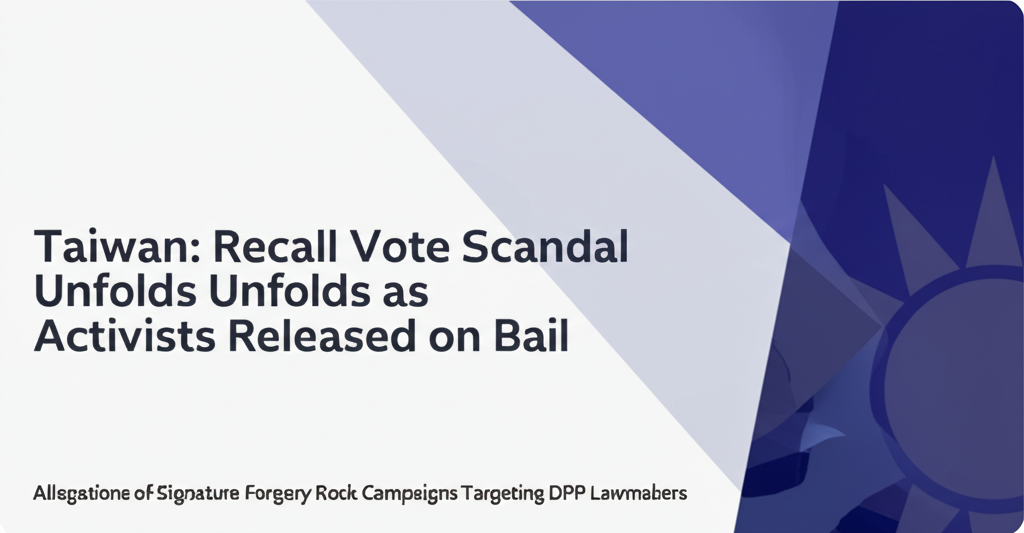Taiwan: Recall Vote Scandal Unfolds as Activists Released on Bail
Allegations of Signature Forgery Rock Campaigns Targeting DPP Lawmakers

Taipei, Taiwan – A political storm is brewing as six individuals were released on bail, with another freed without bail, following questioning regarding the alleged falsification of signatures on recall vote petitions targeting Democratic Progressive Party (DPP) lawmakers.
The controversy centers around two recall vote campaigns aimed at DPP lawmakers Wu Szu-yao (吳思瑤) and Wu Pei-yi (吳沛憶), representing Taipei's first and fifth electoral districts respectively. The case has brought increased scrutiny to the process of recalling elected officials in Taiwan.
Liu Ssu-yin (劉思吟), Lai Yi-jen (賴苡任), and Man Chih-kang (滿志剛) were each released on NT$500,000 bail. Lee Hsiao-liang (李孝亮) and Lin Jui (林叡) posted bails of NT$300,000, and Chen Kuan-an (陳冠安) posted NT$200,000, according to the Taipei District Prosecutors Office.
Liu, Lai, Man, and Chen are affiliated with the Kuomintang (KMT) Youth League, and have been known as the "four knights of the recall Wu campaign."
The six suspects are currently banned from leaving Taiwan.
Another activist, Chang Ko-chin (張克晉), who led the campaign against Wu Szu-yao, was also questioned as a suspect and released without bail.
Four others were questioned as potential witnesses: Hsieh Li-hua (謝麗華), a co-organizer of the Wu Pei-yi recall campaign; Hsieh's husband, surnamed Chen (陳); Jan Chia-wen (詹嘉文), lead proposer in the first stage of the Wu Szu-yao recall campaign; and Lee's mother, surnamed Chen (陳).
The judicial investigation, which included searches of six residences, has sparked accusations from the KMT that prosecutors are targeting opposition activists for political reasons.
KMT lawmakers Wang Hung-wei (王鴻薇), Lee Yen-hsiu (李彥秀), Lo Chih-chiang (羅智強), and Hsu Chiao-hsin (徐巧芯) voiced their concerns outside the Taipei District Prosecutors Office, denouncing what they called "judicial injustice" and "political persecution."
Dozens of officers from the Zhongzheng First Precinct of the Taipei City Police Department were deployed to maintain order.
The investigation into alleged recall vote fraud began in March following complaints from DPP members, including party spokesperson Justin Wu (吳崢) and Taipei City Councilor Liu Yao-jen (劉耀仁), according to the Taipei District Prosecutors Office.
The accusations involve possible criminal document forgery and violations of the Personal Data Protection Act.
The Investigation Bureau's Taipei branch, under the direction of Taipei prosecutors, has gathered information from the Central Election Commission (CEC) and the Taipei City Election Commission.
Prosecutors have stated that several signatures on the recall petitions were submitted without the signers' knowledge or consent.
Under the Public Officials Election and Recall Act, citizens may initiate recalls by collecting signatures and submitting petitions to the CEC.
If enough valid signatures are gathered—at least 1% of the district's eligible voters in the first round, and 10% in the second—the official faces a public recall vote.
Taiwan is currently experiencing an unprecedented number of recall vote campaigns, with supporters of both the DPP and KMT aiming to unseat numerous lawmakers from opposing parties.
